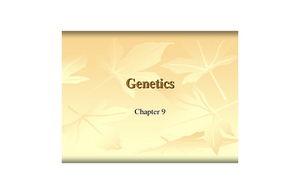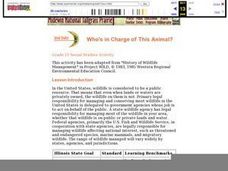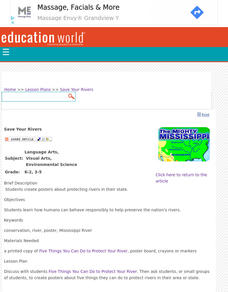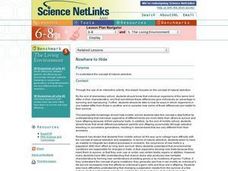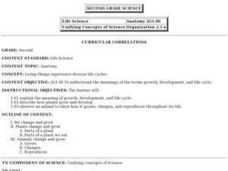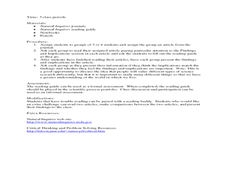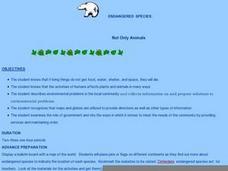Curated OER
Genetics
Students create a checklist of traits common in all of their families. Uisng a table, they compare and contrast their family members to non-family members. They also review dominant and recessive traits and discuss how knowing about...
Curated OER
Reading the River
In collaborative groups, young ecologists measure the temperature, pH, and dissolved oxygen for three different freshwater samples. They examine each sample with a microscope and record observations on the microorganisms in the pond...
Curated OER
Who's in Charge of This Animal?
Eleventh graders study wildlife management and identify the appropriate government agencies that are in charge. They examine different wildlife management techniques. They write a letter showing interest in the activities of one of the...
Curated OER
Recycling Survey
How many people really recycle recyclables and how do they feel about it? High schoolers create a survey to find out. Once they agree on what questions to include, they each interview four people outside of the classroom....
Curated OER
Protecting Your Identity--and Helping Other Protect Theirs
Students create a presentation explaining how they can guard against identity theft. Prior to creating the presentation, students research identity theft: how it occurs, how to avoid it, what to do when someone thinks it has happened to...
Curated OER
Right to vote...in the wrong place
Students create a presentation for other class members or for a local citizens' group explaining how they can guard ensure voter rights. Students research the Ohio Secretary of State's stand on provisional voting rules.
Curated OER
Ozone: The Earth's Security Blanket
Students work in groups to define and research the terms: ozone, troposphere and stratosphere. Students watch videos, conduct Internet research, participate in discussion groups and complete worksheets.
Curated OER
Land Use Unit
Pupils identify factors in human society and the natural environment aree interdependent. They analyze interdependencies demonstrated in various situations and occurances.
Curated OER
Developing Cause and Effect Understanding in Severly Multiply Impaired Students
Students are introduced to the concept of cause and effect. Using a switch, they make certain sounds and images appear on their computer. They identify a change in the screen and signal when there is a change in the environment...
Curated OER
Bio-What
Students explore the concept of biodiversity. Through activities, they discover the importance of one species upon another. Students examine food webs, discuss animals interdependence upon one another, and brainstorm why biodiversity is...
Curated OER
Recycling-Taking it Easy on the Environment
Learners review the garbage/landfill graphs included with the lesson. They discuss the information on the graphs and discuss which garbage products come from their homes. Students collect examples of over packaging to share with class...
Curated OER
Nowhere to Hide
Young scholars examine the topic of natural selection. As a class, they write their own definition to survival of the fittest and watch a video. Using the internet, they research how Darwin started to examine this process using finches...
Curated OER
Living Things Experience Diverse Life Cycles
Second graders will study and explain the meaning of growth, development, and life cycle. They describe how plants grow and develop and observe an animal to show how it grows, changes, and reproduces throughout its life.
Curated OER
Great Rivers 2: The Ups and Downs of River Flooding
Second in a three-part instructional activity on rivers, this instructional activity focuses on the flooding that occurs in riparian locations. First, learners take a look at facts about the Amazon River. They read online materials and...
Curated OER
Discussing the Findings and Implications
Learners read a Natural Inquirer article and present the findings and implications to the class. They discuss if the findings match the implications and whether they think they are important.
Curated OER
Chain Reaction
Students study animal behavior and how it changes to its environment. In this animal lesson students design and conduct experiments.
Curated OER
The Importance of Recycling Batteries
Students discover the types of batteries and their uses. They experience static electricity by rubbing glass jars and using it to raise their hair. After discussing the importance of recycling batteries and using ones that are...
Curated OER
Lights Light Up My Life
Students conduct an investigation. In this energy conservation lesson, students observe and make predictions about fluorescent and incandescent light bulbs. Working in groups, students conduct an investigation to compare the two light...
Curated OER
Not So Neutral Views
Students explore ways to use indicators to distinguish between acids and bases. They conduct an experiment to model and discuss the harmful effect of acid rain in our living and non-living environment.
Curated OER
Kindergarten Exploration Tubs
Students identify their names as a symbol for themselves. They describe characteristics of organisms. They utilize tools to gather data and compare size.
Curated OER
Asthma Survey
Students collect survey data on the prevalence of asthma in a community. They summarize and display the survey data in ways that show meaning.
Curated OER
Endangered Species: Not Only Animals
Students research endangered animals and plants. In this biology lesson, students are read Will We Miss Them? Endangered Species by Alexandra Wright before they begin searching for information to complete an endangered species...
Curated OER
Breaking English News - Obama Says BP Must Pay for Oil Spill Clean-up
In this ESL/ELL reading comprehension worksheet, students read or listen to an article entitled, "Obama Says BP Must Pay for Oil Spill Clean-up." They participate in discussion activities, and complete a variety of question types to...
